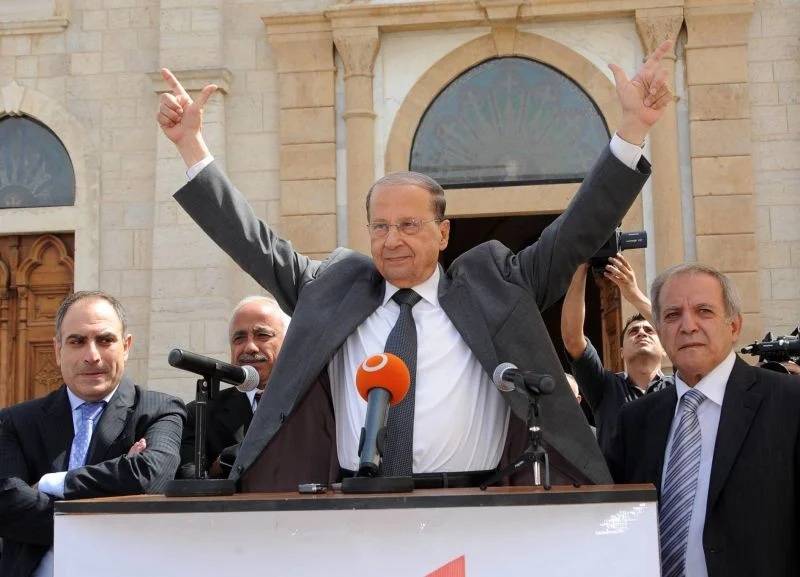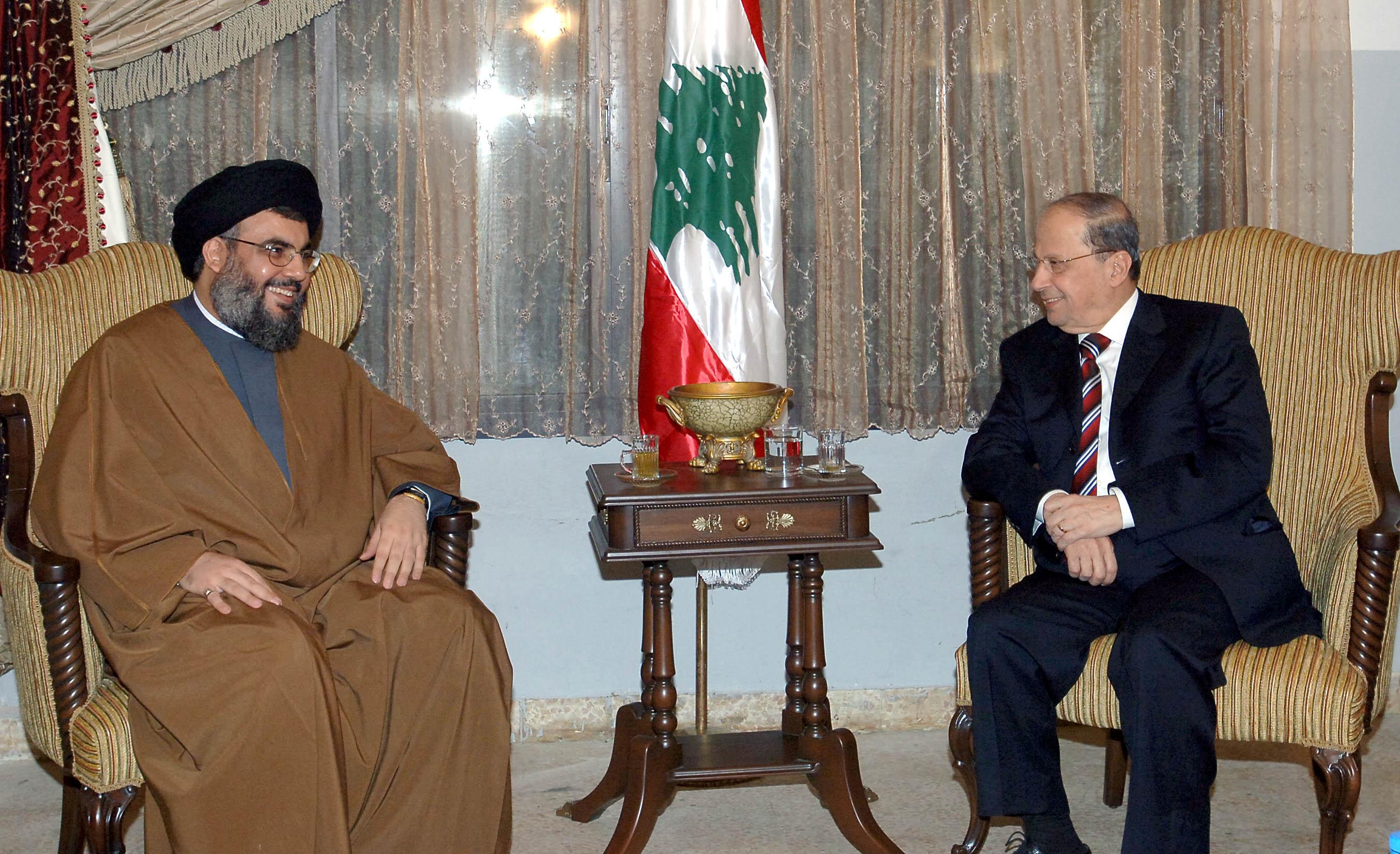
Michel Aoun. (L'Orient-Le Jour archives)
Questions continue to surround Michel Aoun’s ascension to the presidency on Oct. 31, 2016, even now that his tenure has ended.
A particular inquiry arises regarding former Prime Minister Saad Hariri’s true alignment with Aoun’s party, the Free Patriotic Movement (FPM), and whether this alliance had been covertly established for months when he was still, at the time, advocating for Sleiman Frangieh as a potential presidential candidate.
One might wonder if the account that Hariri only backed Frangieh to coax his then ally, Lebanese Forces (LF) leader Samir Geagea into supporting Aoun, as the latter perceived him to be the lesser of two evils, holds any credibility.
Several factors support this scenario, such as the fact that negotiations between Aoun and Hariri kicked off in 2013, which progressed through 2014, and the reconciliation efforts between the FPM and the LF that began in 2015 and culminated in the Maarab agreement on Jan. 18, 2016.
Consequently, the notion of a “conspiracy” to install Lebanon’s 13th president gains plausibility, particularly when considering the favorable outcomes of the behind-the-scenes negotiations.
Undoubtedly, these negotiations are intricately entwined with political, financial, regional and international considerations.
These negotiations began in 2013 following the resignation of the then Prime Minister Najib Mikati’s government and the appointment of Tammam Salam to form a new cabinet toward the end of Michel Sleiman’s term as president.
It was in fact the negotiations launched by Salam to form his government that opened up channels of communication between Hariri’s Future Movement and the FPM, paving the way for exchanges between Hariri and Aoun.
Early the following year, Aoun made a trip to Rome. Meanwhile, Hariri, who was in Paris at the time, proposed a behind-the-scenes meeting with Aoun in the French capital, which was facilitated by Lebanese businessmen and diplomats from the United States, France and Britain.
Hariri arranged for his private plane to transport Aoun back to Paris, where they convened at Hariri’s residence. Only Aoun’s son-in-law, Gebran Bassil, who accompanied him to Rome, was aware of the secret meeting’s arrangement.
As news of Aoun’s absence started to circulate, precautions were taken to prevent any information from being leaked. Likewise, in Paris, fearing that the affair would become public knowledge, Hariri insisted that Aoun spend the night at his residence instead of a hotel, an arrangement to which the then-FPM leader acquiesced.
During the meeting, the two men deliberated on the imperative to enhance relations between their respective parties. Hariri ostensibly went as far as expressing his remorse for not having been able to reach an agreement with Aoun upon the latter’s return to Lebanon in 2005, attributing this failure to his allies.
The discussion encompassed the presidential election and the financial situation in Lebanon. Following Aoun’s return to Beirut, the ties between the parties remained intact.
Aoun urged his son-in-law Bassil to sustain the dialogue, while Hariri entrusted this task to Nader Hariri, his cousin and political adviser.
 Hezbollah Secretary-General Hassan Nasrallah and Michel Aoun. (L'Orient-Le Jour archives)
Hezbollah Secretary-General Hassan Nasrallah and Michel Aoun. (L'Orient-Le Jour archives)
Regional context
In this particular context, just before the end of Sleiman’s term of office, Hariri and Aoun purportedly made significant strides toward reaching a presidential agreement.
The growing proximity between the two was no longer a secret, as leaks about their meetings were circulating in Beirut.
The rapprochement between the two men was encouraged by Western diplomats, notably British Ambassador to Lebanon Tom Fletcher and his American counterpart David Hale, who advised Aoun to engage with Hariri.
Various regional and international factors contributed to this evolving situation. By 2014, the Syrian uprising appeared to be increasingly faltering against the combined forces of Iran, Hezbollah, and the Syrian regime. The Syrian regime in particular capitalized on the rise of jihadist groups, positioning itself as the protector of minority groups. Some Western leaders were quick to concur with this assessment.
At the time, Cardinal Leonardo Sandri, a senior Vatican official and Prefect of the Congregation for the Oriental Churches, aligned with Aoun’s positions.
Apart from the Syrian context, significant progress was made in the negotiations between Iran and the US regarding Tehran’s nuclear program. An agreement was signed in 2015 between Iran and the 5+1 group.
Building on these developments, Aoun believed that he was now closer than ever to the presidency, as western diplomats were actively encouraging Hariri to further strengthen his ties with Gen. Aoun.
In private circles, Hariri reportedly emphasized the need to find a compromise, acknowledging that confronting Iran and Hezbollah in the current climate was an impractical approach and that pragmatism was required.
However, as the growing closeness between Hariri and Aoun became less secret, Saudi Foreign Minister Prince Saoud al-Faisal intervened strongly to pressure the then-prime minister to step back.
Prince Saoud met with Progressive Socialist Party (PSP) leader Walid Joumblatt in Paris to discuss Hariri’s actions. As a result, Hariri was compelled to suspend rapprochement with Aoun until Faisal passed away in July 2015.
“The man who prevented me from assuming the presidency is no longer alive,” Aoun reportedly told his inner circle.
During this period, there was an improvement in relations between the West and Iran, while tensions arose between Washington and Riyadh due to differences between King Abdullah bin Abdelaziz and then-US President Barack Obama.
In Lebanon, contacts were being reestablished between Aoun and Hariri, as well as between the FPM and the LF.
Furthermore, the dialogue between the Future Movement and Hezbollah, which had already seen 34 meetings, continued as part of the modus vivendi between the two parties. However, tensions arose between Hezbollah leader Hassan Nasrallah and Hariri due to Hezbollah’s support for the Houthi rebels in Yemen, much to the dissatisfaction of the Saudis.
Open way
It became evident that Lebanon was leaning toward a political course that favors Iran. Meanwhile, Hariri made the choice to establish closer ties with Frangieh, holding multiple meetings with him in Paris.
Hariri informed Hezbollah about this decision, and the party did not oppose it.
A significant agreement was reached between Hariri and Frangieh, with France’s endorsement of the latter, as evidenced by the telephone conversation between then-French President François Hollande and Frangieh.
It is worth mentioning that the Frangieh option received strong support from Parliament Speaker Nabih Berri and Joumblatt, who preferred him over Aoun for the presidency.
At this juncture, Geagea decided to align himself with Aoun and signed the Maarab agreement, thereby causing a substantial shift in the country’s political landscape. With Geagea’s support, Aoun now enjoyed the backing of the majority of Christians, standing against the influential leader from Zgharta.
This situation prompted Hariri to retract his support and fully endorse Aoun’s candidacy, to the dismay of Saudi Arabia but with the blessing of Western powers.
Aoun’s election marked a significant turning point, demonstrating a growing divide between Lebanon and the Arab states, while Beirut forged closer ties with Tehran. This shift allowed Hezbollah to consolidate its position within the local political landscape.
Hezbollah not only succeeded in electing its ally Aoun as the head of state but also ensured the reappointment of another ally, Berri, as Parliament speaker. Moreover, Hezbollah secured a blocking third, i.e. effective veto power, in future governments, granting the party significant influence.
While it initially appeared to be a resounding political victory for Hezbollah, with the balance of power shifting in its favor, the consequences would be severe years later.
Lebanon experienced an unprecedented economic and monetary collapse, pushing the country to the brink.
This article was originally published in French in L'Orient-Le Jour. Translation by Sahar Ghoussoub.